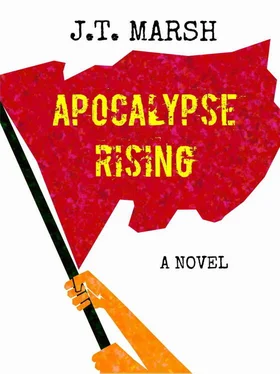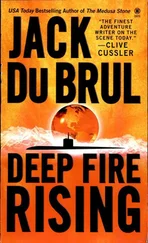Already there are those who would deign to fight the way of things; but they are the few, the proud, the many lost in a sea of even more, in the night a burst of gunfire rattling off somewhere in that maze of densely-packed apartment blocks, in the morning a concrete wall riddled with bullet holes standing a macabre backdrop for the children who walk to school along those very streets and step over the weeds sprouting from between cracks in the sidewalk’s concrete slabs. Spent shell casings sit in the gutter and splotches of crimson dry out slowly on the road, their colour hardly noticeable against the oil stains dotting the asphalt. ‘NO SURRENDER’ scrawls across a wall behind a dumpster, scrawled not in the night that’s just passed but some months, perhaps years earlier and left to slowly fade in the harsh glare of the summer’s sun. It matters little what’s happened in the night. It’ll matter someday soon, but not yet. This, now, is the current expression of our state of war, of the undeclared war we’ve been fighting for so long as any of us have been. It’s a crime, that some old man should suffer the indignity of dying alone, in his little box of an apartment, and then in death to be subjected to the continued indignity of being left to rot like human trash, only disposed of when his odour grew too noxious and disgusting to be ignored. It’s a criminal act that goes unpunished, for now, but not forgotten, even if this one man’s indignity might become lost the indignities of the thousands nevertheless searing a permanent mark on the consciousness of the working man.
At the polytechnic in Brentford, Sean Morrison studies the social sciences. Born and raised in Derry, Northern Ireland, he came of age in the time after the failed revolution fifteen years ago. His parents, Irish nationalists, found themselves in the midst of a pogrom when the chaos of the revolution unleashed long-simmering tensions. They survived, but their home was burnt. Fleeing the province, they moved into a working class block and found just enough work to raise their son. Now in his second year of undergraduate studies, he marches in the streets with the thousands of others, always out of control, but never out of hand. “Never in our name!” he shouts, marching in lockstep with a thousand other students. His feet strike the pavement in strong, confident motions, and he hurls his voice as far as he can. They protest the raising of fees, or so they think; truthfully, they protest only to strike out at the vague but certain perception of injustice, wherever it might be. “Never in our name!” shouts another student. “Never in our name!” shout the thousand others, all at once. The police watch, but don’t intervene. Sean Morrison and the others from the polytechnic are emblematic of the intellectual character of the working class, and they’re courageous in asserting the superiority of their collective knowledge. They revolt against the hierarchical knowledge of the wealthy class as dispensed by the wealthy man’s apparatchik, the teacher.
At the Anglican Church there’re more parishioners than ever, the war fifteen years ago having made many believers. Darren Wright’s been coming to this church all his life; still the same meals are served to the needy, though the soup’s thinner than it’s ever been. He serves the food, hands out blankets in the colder months, and bottles of water in the warmer months. Though the priest, Father Bennett, purports to teach compassion for the poor, but his is a church steeped in a tradition of closeness with the way of things. Darren thinks it wrong the church amasses wealth and power for itself, but he hasn’t yet come to take it on himself to change the church’s course. As it is written in Proverbs 15:27, ‘He that is greedy of gain troubleth his own house; but he that hateth gifts shall live.’ Still, the act of challenging the wayward church’s dominion over his own faith is but a critical step in the parishioner’s revolt against the hierarchical faith of the wealthy class as dispensed by their apparatchik, the priest.
A gruff, older man named Garrett Walker used to work in a factory somewhere in the North of England, a factory that stayed open by all rights far longer than it should’ve. When the factory closed and its new owners moved operations to a city in Bangladesh and another in Poland, Garrett and all the others were thrown out of work. Left to fend for themselves, some took up work at much lower wages as servants, others turned to drugs or alcohol, and at least a few committed suicide out of despair. Garrett, though, moved with his wife and two young daughters into London. Now, he and his wife work night and day to provide for daughters who will soon have their chance taken away for good. As he languishes in unemployment and despair, in Garrett’s mind there’s already flipped a switch from open to closed, his mind hardening against the wealthy man’s dominion. The act of his mind hardening and his heart rendering itself immune to the lies of the managerial apparatchiks is the decisive, critical step in the worker’s revolt against the hierarchical control the wealthy man exerts over all our wealth.
In the British Army serves a young private named Craig Thompson, who joined only a year ago. Stationed at a base not far outside the boundaries of Greater London, he spends his days cleaning the guns and scrubbing floors, on his rare days off spending what little money he earns on booze. It’s a miserable life. But Craig is like so many others in the Army, drawing his pittance on the expectation he’ll never be sent to war. The Army, these days, is a pathetic imitation of its former self, its weapons outdated, its soldiers poorly trained, its officers spending most of their time imagining themselves as inheriting some grand legacy from an empire that no longer exists. On this day, Craig’s cleaning the barrel of an artillery piece older than any of them, winding up dirty, tired, sore, only to look on the officers in their clean, finely-pressed uniforms; he feels the slight tinge of revulsion towards them, but most of all towards his commanding officer, a colonel named Charles Cooke. This army’s a shadow of its former self. The act of recognizing this, of turning his mind against the allure of tradition is that all-important choice the soldier is made in turning against the hierarchical authority the officer exercises over the vast crowd of men.
When he was a younger man, Stanislaw Czerkawski emigrated from his native Poland to England, and found work among many others in shops cleaning floors. By day he cleans, and by night he cleans, always tired but never angry. Sometimes his employer cheats him out of wages, taking off sums for taxes and fees Stanislaw is sure don’t exist. But whomever he and the others complain to, they’re met with racist insults, mocked as dirty Polacks who aren’t worth the wages they’re paid. This, while he cleans human waste off the floor for his wages and lives in a little, one-room flat infested with bedbugs and mice. Too late has Stanislaw realized there’s no place for him in this present-day England. In the meanwhile, like so many other working men mired in poverty and despair he’ll survive despite the indignities meted out on him, and in surviving he’ll learn at some great cost to place his faith in the certainty of the working class struggle. Each of these five men will find their place in the burgeoning resistance, still carrying itself out in the shadows but sooner than any man thinks to step out into the light.
At the general strike that’s about to unfold, coordinated not by months of careful, deliberate planning but by the passions of the moment, memories of the failed uprising fifteen years ago will rule the day. Still Valeri will be there, there to witness history in the making. But among the crumbling walls and the rusting metal beams surrounding him whenever he walks the floor, there’s the spirit of no surrender, the instinctive need to act against the way of things, before this current chance is lost. At night, one night, while Hannah and Valeri sleep, in the alley behind their little apartment there’s a rusty, old pipe, one of many, this pipe springing a leak in just the wrong place. In the morning, Hannah wakes up first, discovering the water shut off. There’s a note slid under the door. ‘A pipe burst. Going to be 2 weeks until the parts get in. No hot water until then. – Graham.’ Hannah swears, then leaves the note on the counter. Valeri finds it, swears again, then leaves it on the counter. The next time they see each other, a few days later, with still the water shut off Hannah has already decided to fix the water herself, heading down into the basement with little more than a few pieces of rubber tubing and a toolbox half-filled with old tools. At the end of the day, Hannah wipes the muck and grime from her hands and heads back to the apartment, turning the tap on and running her hand under the stream of water, warm, then hot, feeling satisfied. Even as this minor victory is won, there’s a thousand defeats handed down on people like her, in secret, in offices and in boardrooms men in suits and ties cutting deals to trade off entire city blocks at a time. These acts of war are interspersed with the attacks of the policemen on the streets here in London, all over England, too, though the policemen’s attack can no longer succeed in terrorizing into submission the policemen carrying their attacks out anyways. As the working man acts, so must his opponents react, compelled as all are by greater forces to play their roles to the end.
Читать дальше











